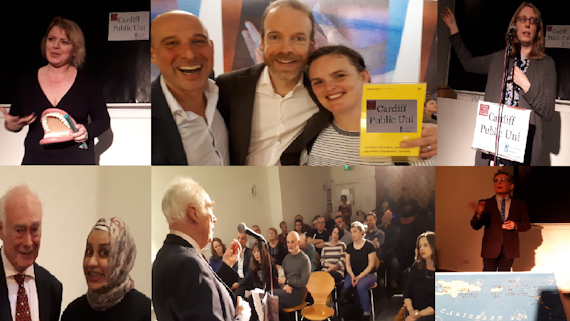Public Uni 24
Mae'r digwyddiad hwn wedi dod i ben
Cysylltu
Arbedwch i'ch calendr

At Public Uni, Cardiff University academics present their most exciting research in short 10-minute chunks. Enrolment is free, the syllabus is varied, and the only entry requirement is an inquisitive mind.
We had a fantastic range of topics at the March event, ranging from tax dodging to gravitational waves, and with a Nobel prize winner rounding off the evening talking about stem cells and gene targeting.
Presentations
On Illicit Finances through International Secrecy Jurisdictions
Dr Lyla Latif, Visiting Doctoral Candidate University of Nairobi, School of Law & Politics
This talk explored the physical movement of wealth across borders. Tax dodging and illicit money transfers occur have direct consequences for nations across the globe, in particular African countries. Lyla has gained years of experience as a litigator. She has worked with the Tax Justice Network and Kings College London to identify gaps within the international corporate tax architecture that facilitates illicit financial flows through the creation of global wealth chains. Lyla has participated in a global collaboration financed by the European Commission's Directorate-General for Research and Innovation under Grant No. HEALTHF1-2012-305240 on 'Formulating New Goals for Global Health, and Proposing New Governance for Global Health that will allow the Achievement of these Goals.' www.go4health.eu
On Teeth & Oral Health
Dr Ilona Johnson, Senior Clinical Lecturer, School of Dentistry
Ilona is a Senior Clinical Lecturer and Honorary Consultant in Dental Public Health in Cardiff. She is particularly interested in research to reduce health inequalities, improve oral health and enhance oral health care quality amongst older adults by working across disciplines. Following the completion of her Masters in Dental Public Health in 2008, she was appointed as a Walport Clinical Lecturer and Honorary Specialist Registrar in Dental Public Health working at Cardiff University and Public Health Wales. During her specialist training, she undertook a number of pieces of work including, pandemic influenza planning, work to develop dental contract pilots in Wales, domiciliary care pathway development and a needs assessment for special care dentistry. Her PhD research used mixed methods and explored non-dental healthcare workers' (i.e. nurses and carers) emotional experiences of caring for the adult mouth.
On Sanity & Insanity of Imperialism
Professor David Boucher, School of Law and Politics
David talks about colonialism and what drives human behaviours, David’s research interests include Modern Political Theory, History of Political Thought, Theory of International Relations, Human Rights, Collingwood and British Idealism, and Popular Culture. He is professor of political philosophy and international relations, and Director of the Collingwood and British Idealism Centre at Cardiff University. He has previously held visiting fellowships and professorships at the Australian National University; Canterbury University, Christchurch, New Zealand; The National Sun Yat Sen University, Taiwan; and Oxford University. He is a fellow of the Academy of Social Sciences; the Royal Historical Society; and the Learned Society of Wales, on whose Council he serves.
On Listening to the Universe
Dr Katherine Dooley, Leverhulme Prize Winner & Reader, School of Physics & Astronomy
Katherine works in the exciting field of experimental gravitational-wave physics. She regularly manipulates Heisenberg’s Uncertainty Principle and on occasion even finds time to prototype tilt-free seismometers to filter out the unwanted effects of Einstein’s Equivalence Principle. Predicted by Einstein in his General Theory of Relativity over 100 years ago, gravitational waves are extremely small ripples in space-time created by astrophysical events like the collision of black holes or the death explosion of stars. A network of gravitational-wave detectors around the world, from the U.S. to Italy and Japan, have been and will be used to directly detect the effects of gravitational waves here on Earth. The first detection in 2015 of two black holes that collided while traveling at half the speed of light(!) made headlines around the world and earned the founders of LIGO (the Laser Interferometer Gravitational-wave Observatory) the 2017 Nobel Prize in Physics. Katherine helped build the LIGO detectors and she is designing new technology to make them even better. In 2018, Katherine won the Leverhulme Prize for her contribution to science.
On Stem Cells and Gene Targeting
Professor Sir Martin Evans, Nobel Laureate & Professor, School of Biosciences
The Nobel Assembly announced Professor Sir Martin as one of three Nobel Prize winners in 2007 for “a series of ground-breaking discoveries concerning embryonic stem cells and DNA recombination in mammals.” Sir Martin was the first scientist to identify embryonic stem cells, which can be adapted for a wide variety of medical purposes. His discoveries are now being applied in virtually all areas of biomedicine – from basic research to the development of new therapies. This research has created the technology known as gene targeting, now used in virtually all areas of biomedicine – from basic research to the development of new therapies. Gene targeting is often used to inactivate single genes. Experiments can then shed light on the role of the genes in development, ageing and disease. The technique has already produced more than 500 different models of human disorders, including cardio-vascular diseases, diabetes and cancer.
Future events
If you would like to present at one of the forthcoming Public Uni events, please get in touch. The March event was organised by Dr Mark Taubert.
Market Road
Cardiff
Cardiff
CF5 1QE